News
Why must we pay this price, ask victims of mob attacks
The mobs that hurled the stones were largely outsiders. But the men that threw bottles of petrol into his wholesale shop and struck the match while his family quaked in the flat above were from his own village.
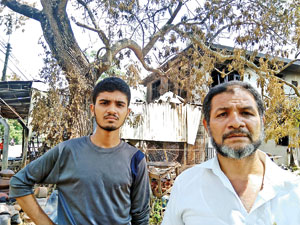
Mr Saffwan and his son
And that is what’s tearing communities apart in areas where, on Sunday and Monday, violence was unleashed on ordinary Muslims on the pretext that they were somehow responsible for the April 21 terrorist bombings targeting Catholics and foreigners. People who cohabited for years–ate off the proverbial “same plate”–have turned foes.
There is nothing left, 55-year-old M. T. M. Saffwan said, stepping gingerly amidst the ruins of his shop. The attackers came in waves, starting around 10 p.m. on May 11. The fire was lit at 10.45 p.m.
Mr Saffwan is a father of three. His wife is of Sinhalese origin–nee Abeysinghe Mudiyanselage Pushparani–and converted to Islam at marriage. His daughter, a divorcee with a child, was so shaken by the attacks that she has started babbling.
It is just eight years since Mr Saffwan shifted from a rented property in Hettipola to his own new building on the outskirts. The shop sold everything from rice cookers and chairs to woven mats and buttons. The first surge smashed the earthenware pots stacked outside. It only got worse.
“I got a call that people were coming this way and to take my car to safety,” Mr Saffwan said this week. He and his son parked the car in the house opposite, which belongs to a Christian. When they turned back, the gangs were already around his shop.
“I telephoned the police,” Mr Saffwan recounted. “They kept saying they will come but they didn’t. The HQI [Headquarters Inspector] did not even pick up. Later the forces, those with black cloth over their faces, came.”
Most of the assailants were intoxicated. And many came on motorbikes. Three men started the fire after the others had left. They are unemployed and don’t live far from their home, said Safran, Mr Saffwan’s 23-year-old son who captured the flames on his mobile phone.
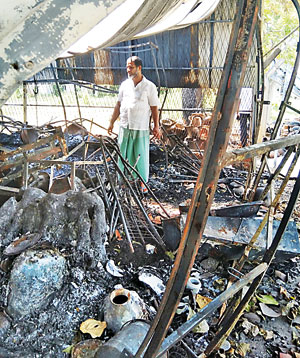
Mr. Saffwan in his burnt down shop
“My family was inside and started screaming in fear,” Mr Saffwan said. “I was scared to call them down so I asked the Sinhala neighbour who lives behind our house to shout out to them. He lent me his voice.”
They escaped the conflagration but are fearful and worried about how to regain their livelihood. They are also confused about their place in the village.
Sinhalese friends and neighbours have commiserated and expressed sorrow. Mr Saffwan’s Sinhalese in-laws gave them food and offered shelter. On the day we visited, a retired public official who is Mr Saffwan’s longtime customer stood on the roadside urging him not to habour anger against the Sinhala community.
When those that victimised him lurk among people he interacts with everyday, however, trust is hard to resurrect. Mr Saffwan knows that the majority of attackers were part of an organised mob that came from outside the area. But there were known people amongst them. The gangs were assisted by local residents who pointed out Muslim-owned properties and sometimes participated in the violence.
In Hettipola, Muslim homes, mosques and businesses were accurately pinpointed. Many are now identifiable from the shattered windows. Moulavi I L M Ruwai stood forlornly near his blackened aluminum sheets, plywood and ceiling shop. Nothing could be salvaged from it. Next door was an Ayurveda medical shop–a Muslim-run “Sinhala beheth badu kadey”–which had also been set alight.
In Kottampitiya on Thursday, thin wafts of smoke still furled out of a burnt-out shop or two. M S M Suleiman is a 31-year-old fruit-seller in Hettipola town. Bananas and apples are rotting on the ground where the remnants of his stall stand. Victims of the attacks are not cleaning up till valuers and insurance assessors have made their estimates.
Mr Suleiman’s property was targeted on Monday afternoon. He had boarded up the stall and rushed home to his wife and three-year-old son when he heard that anti-Muslim mobs were on the loose. “On this street, every single Muslim shop was targeted,” he said. “How did they know? And they were roaming about even after curfew was declared. They attacked our mosque.”
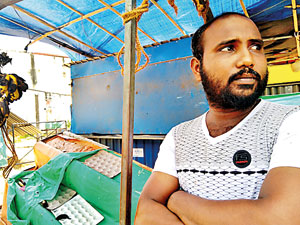
Mr Suleiman, the fruit-seller
That mosque is the Al Masjidun Noor on Bogolla Road. Its tiled floor is littered with broken glass. The men gathered there on Thursday claimed that a majority of gang members were from the village. They were drunk, and some swung bottles in their hands as they went on the rampage.
“A germ has entered into their minds, just like a germ entered into the minds of our ‘sakkiliyo’ [outcasts, referring to Muslim terrorists],” said A M Renees, a 38-year-old chicken farmer, speaking of the mobs. “Now, there is no difference between the two.”
Hettipola is not a pleasant place today. Sinhalese vendors refused to be interviewed. They did not interact with the Muslims. “Last Ramazan, Sinhala people came to our mosque to break fast,” said Shyam, 36, a businessman. “This time, it’s the opposite of that. They don’t look at our faces now and we don’t look at theirs.”
The Masjidul Huda mosque in Kottampitiya was one of the worst affected. Apart from the ubiquitous broken glass, Qurans had been pulled from their shelves and set on fire. The storeroom was also blackened. The annual collection was stolen from its box. The generator was destroyed. The CCTV cameras were demolished. Chairs were broken. The wall clock has snapped in half. There is evidence of heavy violence.
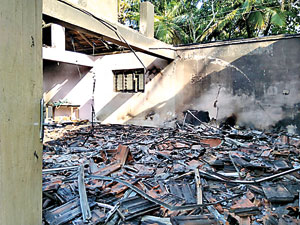
The Al Jamaliya Arabic College hostel
The gangs were shouting insults, worshippers said. Some yelled that the Muslims were ISIS terrorists who had killed children. Farhan, a 38-year-old office helper, ran to his home behind the mosque where his wife was breastfeeding his ten-month-old son. He begged the marauding men not to attack the house. But they shattered the windows anyway.
“Not everyone is bad,” said Salman, a young graduate. “I saw how a Sinhala man set fire to a picture palace [framing shop] and his own wife and child tried to put it out and help the owner. There are others who reached out to Muslims who were affected. We don’t say everyone is bad.”
I L Kamardeen, 46, ran that shop. He said that his “Sinhala brothers” brought the army to his establishment and helped extinguish the flames. “The next door neighbour gave my wife shelter,” he added.
There were glimmers of hope such as these amidst the gloom. But the evidence of mass aggression against an identified ethnic group using the pretext of bomb attacks that occurred three weeks prior is clear. Muslims in these villages believe economic jealousy and other latent biases also played a role.
“The police, the Government, know who the ISIS terrorists are,” said Mr Renees. “Muslims helped them arrest those criminals. They were sent out from our society. We don’t accept them. So why must we pay this price?”
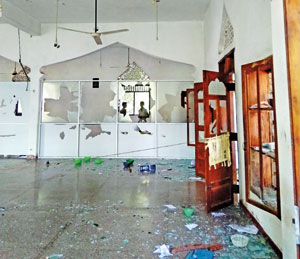
The Masjidul Huda mosque
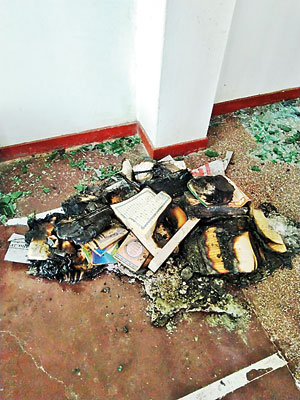
Burnt Qurans at Masjidul Huda mosque

